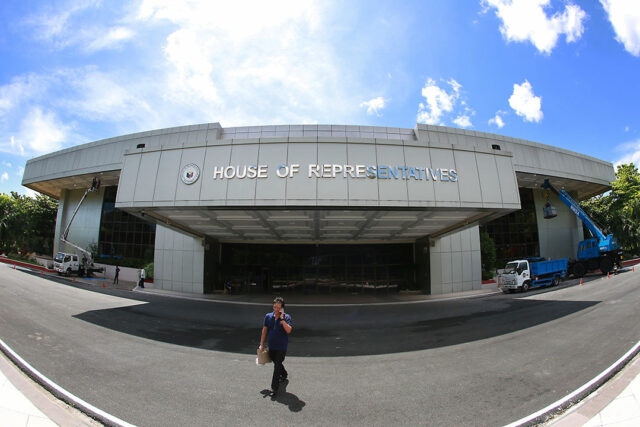By Beatriz Marie D. Cruz, Reporter
THE NATIONAL Government’s (NG) outstanding debt jumped to a fresh high of P15.48 trillion as of end-June, reflecting the impact of the peso depreciation against the US dollar, the Bureau of the Treasury (BTr) said.
Data from the BTr on Tuesday showed that outstanding debt inched up by 0.9% to P15.48 trillion as of end-June from P15.35 trillion as of end-May.
Year on year, the debt stock increased by 9.4% from P14.15 trillion a year ago.
 In a statement, the BTr said that the rise in debt was “due to the net issuance of both domestic and external debt and the effect of peso depreciation.”
In a statement, the BTr said that the rise in debt was “due to the net issuance of both domestic and external debt and the effect of peso depreciation.”
“This was partially offset by the impact of third-currency depreciation on the valuation of corresponding debt denominated in those currencies,” it added.
According to the BTr, the peso depreciated by 13.4 centavos to P58.658 per dollar as of end-June from P58.524 per dollar as of end-May.
The bulk or 68.29% of the total debt stock came from domestic sources.
As of end-June, outstanding domestic debt edged up by 1.2% to P10.57 trillion from P10.44 trillion in the previous month. Year on year, it increased by 9% from P9.7 trillion.
“The increase in domestic debt was primarily driven by the P129.89-billion net issuance of government securities and the P0.39-billion effect of peso depreciation on foreign currency-denominated domestic debt,” the Treasury said.
Government securities accounted for nearly all of domestic debt at end-June.
Meanwhile, external debt, which accounted for 31.71% of the total, inched up by 0.1% to P4.91 trillion as of end-June from P4.9 trillion in the previous month.
External debt jumped by 10.5% from P4.45 trillion in June 2023.
“The increment is attributed to P7.95 billion in net availment and the P11.23 billion upward revaluation of US dollar-denominated debt due to peso depreciation. This was partially offset by the P13.56-billion effect of favorable third-currency adjustments,” the BTr said.
External debt was composed of P2.29 trillion in loans and P2.62 trillion in global bonds.
This consisted of P2.22 trillion in US dollar bonds, P217.39 billion in Euro bonds, P62.92 billion in Japanese yen bonds, P58.66 billion in Islamic certificates and P54.77 billion in peso global bonds.
Meanwhile, the NG’s guaranteed obligations dropped by 1.9% to P343.65 billion as of end-June from P350.2 billion as of end-May. It also declined by 7.1% from P369.73 billion in the same period in 2023.
“The decline was primarily driven by the net repayment of both domestic and external guarantees amounting to P5.02 billion and P0.73 billion, respectively,” the BTr said.
“Additionally, the impact of third-currency adjustments against the US dollar amounting to P1.18 billion was able to offset the P0.37-billion increase caused by peso depreciation.”
Security Bank Corp. Chief Economist Robert Dan J. Roces said that the higher debt as of end-June was partly due to the peso’s depreciation against the US dollar, “which inflated the value of foreign-denominated debt.”
“To manage this, the government may need to boost revenue through efficient tax collection and spending and prioritize economic growth to increase its capacity to repay debt,” he said in a Viber message.
Jonathan L. Ravelas, senior adviser at Reyes Tacandong & Co., said the higher debt stock could also be attributed to “increased economic recovery efforts (subsidies and infrastructure spending).”
Ruben Carlo O. Asuncion, chief economist at Union Bank of the Philippines, Inc., said the higher debt level can be blamed on elevated interest rates.
UNPROGRAMMED APPROPRIATIONS
Meanwhile, Finance Secretary Ralph G. Recto on Tuesday warned against additional borrowings to fund unprogrammed appropriations next year, saying these could raise the country’s debt-to-gross domestic product (GDP) ratio to 61.4% by end of the year, from the targeted 60.3%.
As of the first quarter, the NG’s debt as a share of GDP stood at 60.2%, slightly above the 60% threshold deemed manageable for developing economies.
At a Senate Health and Demography Committee hearing, Mr. Recto said using debt to fund mostly official development assistance (ODA) projects would hike the deficit-to-GDP ratio to 6.4% by end-2024. The government has set the deficit ceiling at 5.6% of GDP this year.
“In effect, we will not hit our medium-term fiscal program, and this may put pressure on our investment grade rating. If we deny (foreign-assisted projects) of funding, the implementation is delayed, and we rack up opportunity costs that will be borne by the public deprived of the convenience such projects bring,” he said.
The Finance chief said the additional borrowings would mean interest payments would rise by P12.7 billion annually.
Projects funded by unprogrammed appropriations include the Davao City By-Pass Construction Project, Samal Island Davao City Connector Project, Panay-Guimaras-Negros Island Bridges, Bataan-Cavite Interlink Bridge Project and the Metro Manila Subway Project among others, according to a DoF statement.
Mr. Recto was defending the Department of Finance’s (DoF) order to withdraw from the idle funds of government-owned and -controlled corporations (GOCCs), which he said was aboveboard.
The DoF had consulted the Commission on Audit, the Governance Commission for GOCCs, and the Office of the Government Corporate Counsel before making the fund transfers, he said.
“But please curate the expenditure program without inflating the unprogrammed appropriations side, because this distorts the country’s fiscal plan,” Mr. Recto urged lawmakers at the hearing. — with John Victor D. Ordoñez









 The program kicked off with the opening remarks of Chief Operating Officer Ronald Ang. His opening remarks focused on the importance of overseeing change, and discussed certain external factors that might affect the growth of business. He also tackled the reason for the need to change and be ready for any circumstances. He also emphasized that Castrol will always look for long-term solutions and always move forward not only on the innovation of the products but also improve commitment towards partners with what Castrol offers.
The program kicked off with the opening remarks of Chief Operating Officer Ronald Ang. His opening remarks focused on the importance of overseeing change, and discussed certain external factors that might affect the growth of business. He also tackled the reason for the need to change and be ready for any circumstances. He also emphasized that Castrol will always look for long-term solutions and always move forward not only on the innovation of the products but also improve commitment towards partners with what Castrol offers. The program proper began with the launching of Castrol Reignite. This was conducted by the Growth Unit Manager of Castrol Asia Pacific, Marlina Kamaruddin. She started with featuring the milestones of Castrol for the past 125 years and what Castrol changed for the lives of our community. She also covered the top facts about Castrol like the involvement of the brand to the space industry. She is also proud that Castrol is now serving over 150 countries around the world. Another thing that Marlina was proud of is that Castrol is touching 200,000,000 customers all over the world.
The program proper began with the launching of Castrol Reignite. This was conducted by the Growth Unit Manager of Castrol Asia Pacific, Marlina Kamaruddin. She started with featuring the milestones of Castrol for the past 125 years and what Castrol changed for the lives of our community. She also covered the top facts about Castrol like the involvement of the brand to the space industry. She is also proud that Castrol is now serving over 150 countries around the world. Another thing that Marlina was proud of is that Castrol is touching 200,000,000 customers all over the world. Final presenter for 2024 Reignite event was the Sales Director for Castrol-NTM, Grace Lao-Torrejas. Her discussion focused on the connection of Gen Z to the market as they make up 27% of the workforce. Also, Ms. Lao-Torrejas centered the discussion on the usage of Gen Z of social media, in which the Philippines ranked first with the highest social media usage rate of 60%. As a future customer, they are highly opinionated with high likelihood of “cancel culture” if brand issues are not properly attended. Ms. Lao-Torrejas also shared that Asian Gen Z, despite their objection, are forgiving and might support the brand again so long as the brand’s promise is lived by. The presentation concluded on Castrol being equipped on these changes in the market and is ready to move forward.
Final presenter for 2024 Reignite event was the Sales Director for Castrol-NTM, Grace Lao-Torrejas. Her discussion focused on the connection of Gen Z to the market as they make up 27% of the workforce. Also, Ms. Lao-Torrejas centered the discussion on the usage of Gen Z of social media, in which the Philippines ranked first with the highest social media usage rate of 60%. As a future customer, they are highly opinionated with high likelihood of “cancel culture” if brand issues are not properly attended. Ms. Lao-Torrejas also shared that Asian Gen Z, despite their objection, are forgiving and might support the brand again so long as the brand’s promise is lived by. The presentation concluded on Castrol being equipped on these changes in the market and is ready to move forward.
















